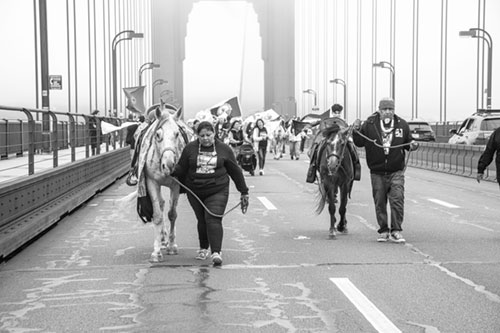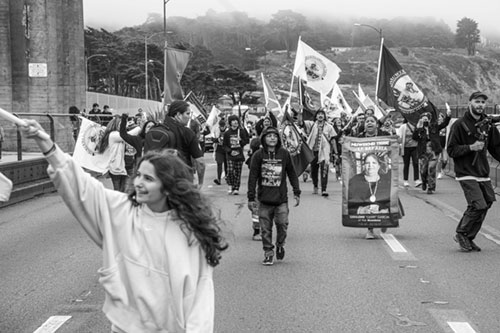Ohlone Tribal Chairwoman Calls on President Trump and Elon Musk to Launch DOGE Probe of San Francisco Presidio Trust

FOR IMMEDIATE RELEASE March 31, 2025
- For more information:
- Matt Ricchiazzi,
716-548-3371
matt@muwekma.org
Ohlone Tribal Chairwoman Calls on President Trump and Elon Musk to Launch DOGE Probe of San Francisco Presidio Trust
SAN FRANCISCO, CA — Charlene Nijmeh, the Tribal Chairwoman of the Muwekma Ohlone Tribe, is calling on President Donald J. Trump and Elon Musk to investigate the true financial position and contracting practices of the Presidio Trust and its ties to former Speaker Emerita Nancy Pelosi.

“If the Presidio Trust is truly generating an operating profit, as it claims, then why did Rep. Pelosi pour $200 million into it as part of the Inflation Reduction Act,” postulates Chairwoman Nijmeh. “If the Presidio Trust isn’t paying for its own capital budget, where are all those operating profits flowing? The obvious solution is to stop the bleed of financial government funds and return the land to the Muwekma Ohlone Tribe.”
In recent weeks, the Tribe has submitted a formal presidential request that the Administration transfer title of the lands back to the Tribe – which has never ceded or surrendered aboriginal title to the site. The move would eliminate federal taxpayer spending and constitute one of the most significant rematriations of land in U.S. history.
Just last month, President Trump issued an Executive Order stating the Administration’s intention to dissolve the Presidio Trust, a federal agency established in 1996 to redevelop the former military installation. Ever since, the Presidio Trust has served as a lucrative base of patronage for the political machine led by former Senator Diane Feinstein and the Speaker Emerita, who both have made their homes within blocks of this section of San Francisco.
“I don’t want an Indian Tribe in my City,” Feinstein told the former tribal chairwoman at the time, a statement that Nijmeh says still offends tribal officials today.
Both elected officials have been staunchly opposed to the tribe’s 45-year struggle to reaffirm its federal status. When the Tribe submitted a Right of First Refusal to the federal government during the decommissioning of the military installation in 1992, both women were opposed.
“As the current administration works to eliminate the Presidio Trust as part of its effort to streamline the federal workforce, we stand ready to offer a cost-effective, environmentally responsible solution to filling the stewardship void,” Nijmeh explains. “We are going to make sure that operating revenues from the Presidio leases are reinvested in this extraordinary natural space.”
The Presidio was historically inhabited by Ohlone ancestors for countless generations. Returning it to the tribe’s care represents not only a chance to rectify historical wrongs but also an opportunity for a cultural renaissance for the indigenous communities of the Bay Area.
The site was initially taken from the Ohlone people during the Spanish conquest. It was used as a military fortress from which the empire waged genocidal campaigns that destroyed every single Ohlone Village in the Bay Area. They were held captive at the fort before being enslaved in the Mission system.
The Tribe has identified several concerning financial data points for the Department of Government Efficiency (DOGE) to audit and investigate:
Why are taxpayers putting $200 million into the Trust from the Inflation Reduction Act? Trust claims to be operating with substantial surpluses.
- The Trust has an operating costs of $202 million per year.
- The Trust had a net surplus (net income) of $26.0 million during Fiscal Year 2024 compared to net surplus of $3.5 million in Fiscal Year 2023.
Why is the Trust going into debt? Why is the Trust being allowed to hide away public resources?
- In Fiscal Years 2023 and 2024, the Trust received a total of $158.5 million in loans from the Treasury to invest in a range of projects to create additional revenue streams.
- The Trust has $250 million in total debt.
- Operating costs increased $21.0 million versus Fiscal Year 2023.
The Trust acknowledges it’s deferred maintenance crisis, and admits that it hasn’t even been attempting to maintain 100% of its assets – a shocking admission of its management:
- The Trust’s explanation for deferred maintenance crisis:
“The Trust is responsible for rehabilitation and maintenance of the Presidio’s fixed assets, including infrastructure. Many of the assets have exceeded their depreciable lives (lie life spans of the assets), and the cost to replace them is estimated to be over $500 million. The $200 million Inflation Reduction Act funding supports the replacement of those assets, many of which are utilities in place since the Presidio was an US Army post. Regular and ongoing maintenance of assets prolongs their useful life and reduces the likelihood of unexpected failures. Maintenances of 100% of the assets is not feasible, so the Trust evaluates deferred maintenance on an annual cycle and identifies the most important items for replacement. Annual budgetary constraints are considered in evaluating the replacement of assets. Deferred maintenance and repairs data can be found in the required supplementary information (RSI) accompanying the consolidated financial statements.”
### END ###
Support the Muwekma Ohlone Tribe

To get involved and support this #Landback initiative please visit https://muwekma.org/presidio/. For additional quotes, interviews, pictures, video footage, or other information, please contact us via email at muwekma@muwekma.org or via phone at 408-852-1677.
About the Muwekma Ohlone Tribe
The Muwekma Ohlone Tribe was previously federally recognized as the Verona Band of Alameda County, was never terminated by an act of Congress, and a federal district court judge in the Northern District of California affirmed that the Tribe has retained its sovereign immunity despite not being on the BIA’s list of officially recognized Tribes.
The Bureau of Indian Affairs erred when it wrongly omitted the Tribe from the official list of recognized Tribes when that list was first drafted in 1978. The Tribe has struggled for more than 45-years to affirm its federal status, petitioning the Congress for legislative recognition and petitioning the Administration for corrective action.